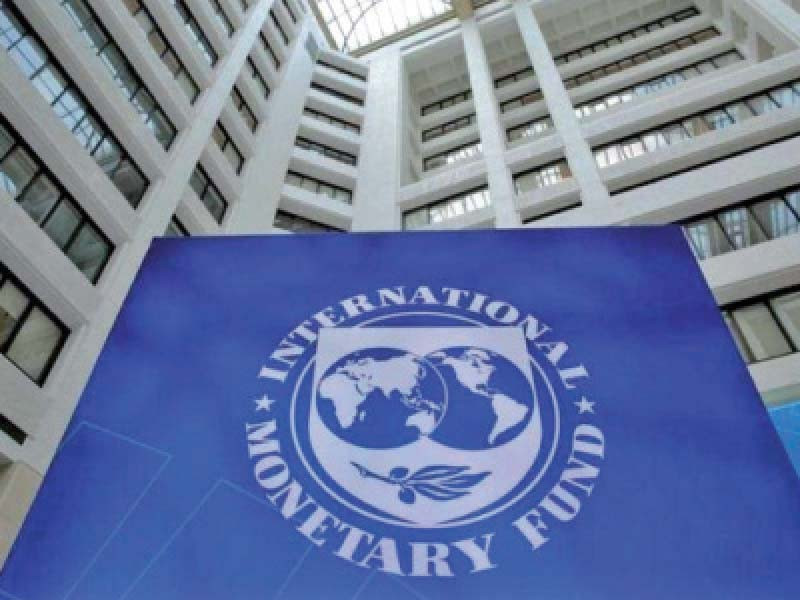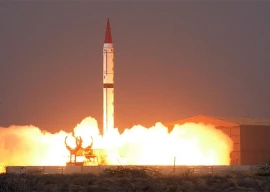
Finance Minister Ishaq Dar on Monday back-pedaled from his statement about the nuclear programme, saying that neither any country nor the International Monetary Fund (IMF) has attached any conditionality about “our nuclear capability”.
The finance ministry issued a statement on behalf of Dar after Pakistan’s Foreign Office and the IMF denied that the global lender had made any demand about the country’s nuclear programme.
“It is clarified that neither IMF nor any other country has attached any conditionality or made any demand from Pakistan with regard to our nuclear capability,” stated Dar.
Speaking at a special session of the Senate in the presence of foreign diplomats, Dar had said last week that “nobody has any right to tell Pakistan what range of missiles it can have and what nuclear weapons it can have. We have to have our own deterrence.”
Dar was the first finance minister who brought up the issue of the range of nuclear missiles into the public sphere. In private conversations, some Pakistani officials had said that there was a longstanding demand by a Western country to abandon the long-range nuclear missile programme.
Shaheen-III is Pakistan’s long-range missile having the capability to take nuclear warheads to a distance of 2,750 km, covering the whole of India and parts of Middle East.
Dar said that his comments regarding Pakistan’s nuclear programme were in response to a senator colleague’s specific question. PPP’s Senator Reza Rabbani had raised the question about the IMF deal.
“I emphasised that Pakistan has the sovereign right to develop its nuclear programme, as it best suits our national interests, without any external dictation, which by no means should in any way whatsoever be linked with the ongoing negotiations with the IMF,” said Dar on Monday. He said that he was “quoted out of context”.
The finance minister last week emphasised that nobody was going to compromise anything on the nuclear or missile programme of Pakistan. He attributed the delay in staff-level agreement to “technical reasons” but did not give a date when the issues would be resolved.
“The delay in the IMF staff-level agreement is purely due to technical reasons, for which we are continuously engaged with the IMF to conclude it at the earliest,” he stated.
Formal talks between Pakistan and the IMF for the completion of ninth review began on January 31 and ended on February 9. Since then both sides have been trying to bridge gaps without much success.
The IMF has asked Pakistan to arrange an additional $6 billion in foreign loans to remain afloat from now till June. The country’s gross foreign exchange reserves have depleted to $4.3 billion and the IMF’s $1.1 billion is not sufficient to fully finance Pakistan’s debt repayment, estimated at $4 billion for the April-June period, excluding the rollovers.
The IMF’s country head also tried to clear misgivings about the conditions of the $6.5 billion loan programme.
Responding to a query by The Express Tribune about Dar’s statement, IMF Resident Representative Esther Perez stated, “I want to be categoric that there is absolutely no truth to this or any insinuated link between the past and the current IMF-supported programmes and decision by Pakistani government over its nuclear programme.”
The IMF’s country head stated that programme discussions had exclusively focused on economic policies to solve Pakistan’s economic and balance of payments problems, in line with the IMF’s mandate for promoting macroeconomic and financial stability.
Pakistan has been trying to seek the United States’ support to convince the IMF to relax its conditions. But the US too has asked Pakistan to fulfill the conditions instead of looking for any back-channel support, according to sources.
Published in The Express Tribune, March 21st, 2023.
Like Business on Facebook, follow @TribuneBiz on Twitter to stay informed and join in the st conversation.


1725612926-0/Tribune-Pic-(8)1725612926-0-165x106.webp)


















COMMENTS (1)
Comments are moderated and generally will be posted if they are on-topic and not abusive.
For more information, please see our Comments FAQ